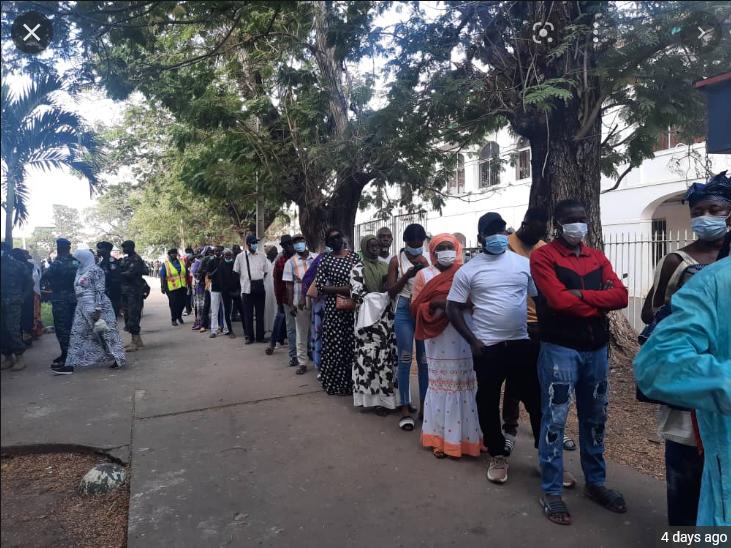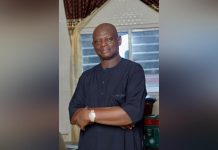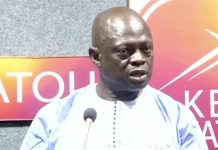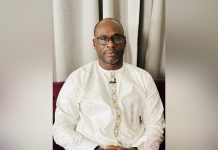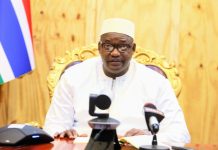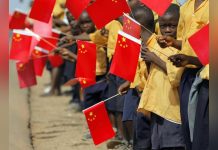Africa-Press – Gambia. “Babili Mansa!” the crowd yelled immediately a voice filtered in from a distance of about 1,929 miles away. It was a voice that was distant yet familiar: the voice of exiled dictator Yahya Jammeh.
The jubilant crowd would soon surge forward, dancing in ecstasy. ‘Babili Mansa’ is the local buzzword for ‘Bridge Builder’, an appellation Mr Jammeh earned at the height of his dictatorial reign in The Gambia.
It was in the first week of November, a few weeks away from the December 4 presidential election. The crowd had gathered at Farafenni in support of Mama Kandeh, the presidential candidate Mr Jammeh endorsed in the December 4 election.
Mr Kandeh, leader and candidate of the Gambia Democratic Congress (GDC), had signed an MoU with supporters of Mr Jammeh’s Alliance for Patriotic Reorientation and Construction (APRC).
In the Gambian media and among citizens, the MoU became a subject of controversies, prompting Mr Kandeh to declare that the agreement did not include Mr Jammeh’s amnesty.
But speaking at the Farafenni rally through a telephone address that sunny afternoon in November, Mr Jammeh promised that the GDC-APRC agreement would end insecurity and electricity problems if Mr Kandeh was voted into office in December.
“By the Grace of the Almighty Allah within four years we would have develop(ed) The Gambia faster than a rocket because I know why,” the ex-president said.
“Within twelve months you will forget about insecurity and electricity problem, (and) school fees, because you know me. You remember in 1994 when I stood in Farafenni and said you will get electricity. They didn’t believe (me) and I did it.”
Jammeh’s influence
It’s a testament to Mr Jammeh’s centrality to political discourse in The Gambia that apart from Mr Kandeh, the ex-president’s party was equally courted by the incumbent Adama Barrow.Earlier in the year, Mr Barrow’s National People’s Party signed a controversial alliance with Mr Jammeh’s party, the Alliance for Patriotic Reorientation and Construction (APRC), to drum up more votes.
The president’s critics feared that the integrity of the Truth, Reconciliation and Reparations Commission instituted to address human rights violations by Mr Jammeh was at stake.
At the time, the commission was yet to release its findings despite concluding hearings, prompting speculation that it might after all be a charade.
In any case, unlike Mr Kandeh’s alliance which the dictator endorsed and spoke favourably about, Mr Jammeh reportedly rejected the party’s agreement with Mr Barrow and his party, leading to sharp divisions within the dictator’s party.
On Saturday, Mr Kandeh polled over a 100, 000 votes in the presidential election, a performance many attributed to the alliance he struck with Mr Jammeh’s party.
Although the GDC candidate finished a distant third in the elections, many have said that his performance reflects how influential Mr Jammeh has remained in Gambian politics, despite being exiled in far away Equatorial Guinea.
But apart from Mr Jammeh’s larger-than-life image in Gambian politics, there are nine other issues that defined the election on Saturday.2. Internet Connectivity
Internet connectivity was a major concern during electioneering, especially among Gambia’s teeming population of young people.
Those who spoke with PREMIUM TIMES said that frequent internet outages and instability have made life quite frustrating for them, impeding development and individual growth.
According to a 2020 Freedom House report, “brief, nationwide connectivity disruptions were recorded in November 2019 and January 2020.”
In February, at least two separate internet blackouts occurred, with one lasting six hours and another lasting 12 hours.
A report even claimed that the president, Mr Barrow, was absent from an online Economic Community of West African States’ meeting due to internet outage.
“Internet connectivity is a major headache and data is damn expensive in The Gambia,” says Abdoulaye, a resident of Banjul who spoke with PREMIUM TIMES Wednesday morning.
“Some young people didn’t vote the president because of their experience with internet issues. They wanted change.”
3. ECOWAS troops
When Mr Barrow defeated the dictator, Yahya Jammeh, in 2016 to become the country’s third president, Mr Jammeh declined to relinquish power.
In the heat of the constitutional crisis sparked by the disputed presidential election, the Economic Community of West African States Mission in Gambia (ECOMIG) was mobilised to restore sanity. Mr Barrow was eventually sworn in as Gambia’s president in January 2017.
After he was sworn in, Mr Barrow asked that the mission, which paved the way for his rise to power, continue its work, citing the ECOWAS soldiers as a stabilising presence in the West African country. The ECOWAS bloc agreed to extend the mission, and the troops have been on ground since 2017.
But in Gambian press and among citizens, many have expressed worry over the continued stay of the troops. There has equally been insinuation that the country was paying heavily for the mission’s continued stay in Gambia.
It was a major talking point during electioneering and analysts believed it shaped some Gambians’ voting decisions.
But speaking at a press conference on Tuesday in Banjul, Mr Barrow said the ECOWAS troops’ mission was beyond the removal of Mr Jammeh from office.
“These are forces from ECOWAS; the Gambia is not even paying for it. They are here to support us,” he said.
4. Infrastructure
The state of infrastructure in Gambia was another major talking point in the days leading to the December 4 presidential election.
A section of Gambians, especially those in support of the incumbent, said the president has performed well in provision of roads, especially in rural areas.
In 2019, the president inaugurated the Senegambia bridge to facilitate trade and travel in West Africa after decades of delays.
The bridge, located on Gambian territory, crosses the River Gambia around 10 kilometres (six miles) from the border post of Farafenni.
“Given the geography of The Gambia and Senegal with a river dividing both countries in two halves, I wonder why it took so much time to have this bridge,” Mr Barrow said in the company of Senegalese president Macky Sall.
But there were also concerns about the Basse-Wuli Bridge, whose completion is expected to strengthen trade and investment among the people.
Aside roads, others who spoke with PREMIUM TIMES claimed that water and electricity supply has been quite epileptic in Banjul and other districts.
“Some people voted because they saw roads in their areas and others voted because there was no electricity in their neighborhoods,” says a staff of SeneGambia hotel who declined to have his name in print.
“The two categories would not vote for the same candidate, you know.”
5. Economy, Inflation & Unemployment
In its economic outlook for 2021, the African Development Bank Group said the Gambia’s real GDP was projected to pick up gradually—growing by 3.2% in 2021 and 5.1% in 2022.
Similarly, inflation was projected to decline marginally to 5.9% in 2021 and 5.7% the following year, while the fiscal deficit was projected to narrow to 3.2% of GDP in 2021 and 2.3% in 2022.
The bank said downside risks to the outlook emanate from possible spending pressures during the 2021 presidential election.
“Failure to secure external assistance and a delay in reopening economies are other potential downside risks,” the bank noted.
Data seen by PREMIUM TIMES showed that The Gambia’s unemployment rate for 2020 was 9.64%, a 0.7% increase from 2019.
The rate for 2018 was 9.02%, a 0.1% decline from 2017. The rise in unemployment, it was inferred, isn’t unconnected with the disruption of the global economy due to COVID-19.
ALSO READ: We’ll have new constitution before end of my term, Barrow assures Gambians
“Many young people wanted jobs and decent living, and that formed part of their voting decisions,” says Omar Momodou, a resident of Bakau.
In September, the International Monetary Fund (IMF) in its intervention said the Gambian economy was showing some early signs of recovery, but the third wave of COVID-19 was weighing on a vigorous rebound.
“The government continues to take the necessary measures to fight the pandemic,” the Bretton Woods institution said.
6. The Darboe phenomenon
Apart from Messrs Jammeh and Barrow, the most influential figure in The Gambia’s politics is opposition leader Ousainou Darboe of the United Democratic Party (UDP).
A Gambian politician and lawyer, Mr Darboe served as minister under President Adama Barrow until March 2019 when things fell apart between the duo and they went their separate ways.
In the 2021 presidential election, Mr Darboe was widely considered the strongest opposition candidate, given the acceptance he enjoys among young people and the aged across Gambia.
There were concerns over Mr Darboe’s health in the days leading to the election.
On Election Day, PREMIUM TIMES reported how the UDP candidate showed up at his polling booth with a rollator walker, confirming pre-election speculation that he has been sick.
Despite his frail health, Mr Darboe remains a major issue in Gambian politics.
He is widely respected among Gambians for his principled opposition to Yahya Jammeh’s dictatorial rule for decades, ostensibly paving way for Mr Barrow’s emergence in 2016.
On Monday, the Gambian police had to fire tear gas cannisters to disperse his supporters who gathered on Kairaba Avenue in protest of Saturday’s election.
The 2021 election, which Mr Darboe lost again to Mr Barrow, is the opposition leader’s fifth attempt to gain access to the presidency.
He contested in the 1996, 2001, 2006, and 2011 elections, but lost in all. Ahead of the 2016 election, he was arrested for protesting against activist Solo Sendeng’s death in detention, and was consequently jailed.
7. TRRC
The Truth, Reconciliation and Reparations Commission (TRRC) is an independent Gambian institution with a mandate to conduct research and investigations into human rights violations committed under the presidency of Mr Jammeh.
The Commission says it aims to prevent a repetition of the violations and abuses suffered under the past regime by making recommendations to government and citizens aimed at ensuring the crimes of the past never recur in The Gambia.
In November, the commission wrapped up the three-year public inquiry by recommending prosecutions for killings, torture and other abuses committed during Mr Jammeh’s tenure.
It delivered its report to President Barrow, nine days before the just concluded presidential election. Nearly 400 witnesses testified before the TRRC, including both victims and perpetrators.
Mr Barrow’s has kept the decision of the government on TRRC’s recommendation under wraps, prompting speculation that he would not adhere strictly to the recommendation.
Many have equally expressed worry over the alliance Mr Barrow’s party had with Mr Jammeh’s as possible reasons the TRRC’s recommendation may not see the light of the day.
On Tuesday, while responding to a question on whether he would attempt to have Mr Jammeh extradited from exile and prosecute him, Mr Barrow said: “It will depend on what is the recommendation and also, it will depend on my technical team.
“We have to look at the report and the recommendation, with my cabinet and my minister of justice. They’ll advise us and cabinet will sit around the table…we just want to assure the entire world and Gambians that there would be justice,” he said.
8. Term Limit/Constitutional Transition
After 22 years of dictatorship under Mr Jammeh, a major expectation of many Gambians lies in constitutional reform and inclusion of term limits. The two issues were at the heart of electioneering in the months leading to the December 4 presidential election.
Dawda Jawara, who led The Gambia to independence, ruled for more than 30 years. In 1994, Yahya Jammeh grabbed power in a coup and went on to rule for additional 22 years, until he was forced out of power in 2016.
Mr Barrow came to office in 2017 with a promise to bring about far-reaching political reform to the nation.
He set up a commission to review the constitution as part of the transition to democracy. The Constitutional Review Commission has since presented Mr Barrow with a draft constitution.
One of the key provisions of the 2020 draft constitution is section 5 which limits the president’s tenure to 10 years of two five-year terms.
On Tuesday in Banjul, Mr Barrow pledged to push through a new constitution that would restrict the number of mandates the president can serve.
He was, however, silent on whether his past five years rule would count as his first term or he would start a fresh count from 2021.
9. Tourism potential
Tourism is arguably the fastest growing sector in the Gambian economy and accounts for about 20 per cent of its Gross Domestic Product.
The tourism industry primarily relies on the charter market, with the vast majority of tourists on package tours. The West African country itself is known for its many sunny beaches.
Expectedly, a major talking point in the election is the country’s tourism potential.
On Saturday, opposition leader Mr Darboe urged his supporters not to do anything that could harm the nation’s tourism sector.
He said: “We will be giving an opportunity to anarchists to take this country into chaos. Remember we are in the tourist season. The slightest disturbance in this country would drive away all the tourists, and that would lead to the laying of several of our young men who are working in this industry.
“We are talking about youth unemployment, so we should not do anything that would jeopardise the situation of those who are already in.”
AWEC 3E4RTHNYUI89O
By far the most significant decider of the 2021 election is the peoples’ desire for peace and political stability in the once turbulent country.
In 2016, at the height of the constitutional crisis caused by Mr Jammeh’s refusal to leave office after being voted out, thousands of Gambians fled the country fearing a possible outbreak of violence.
Reports said that desperate Gambians—–mainly women, children and the elderly—–flocked in vehicles to neighbouring Senegal and Guinea-Bissau.
Since Mr Barrow assumed power, he has been seen as a custodian of peace, tranquility and political stability in the tiny West African country.
Residents told PREMIUM TIMES Wednesday morning in Banjul that the spectre of Mr Jammeh’s draconian rule still haunts many Gambians, hence, the decision to support Mr Barrow in Saturday’s election.
“Our people can trade anything, just anything, for peace and stability,” says Fatou Lamin, a cab driver.
For More News And Analysis About Gambia Follow Africa-Press

